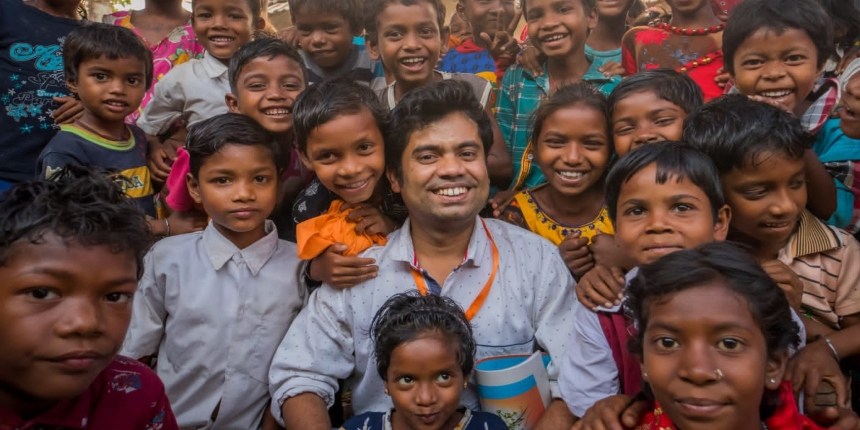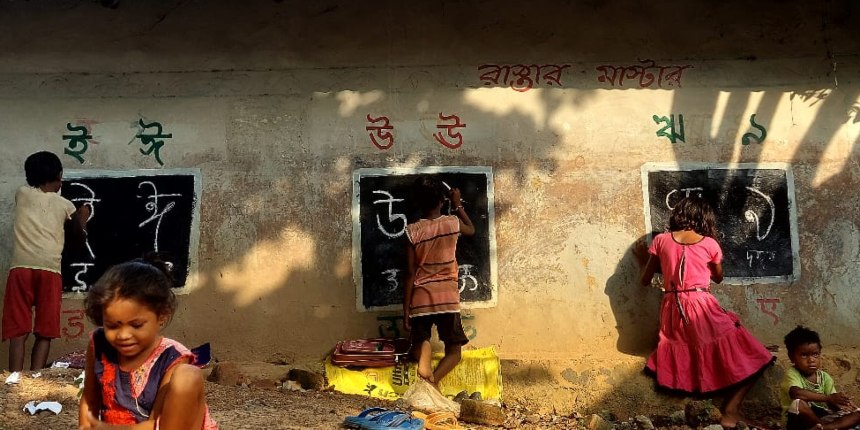West Bengal’s ‘teacher of the streets’ nominated for Global Teacher Prize 2023
Atul Krishna | October 20, 2023 | 11:17 AM IST | 8 mins read
Deep Narayan Nayak turns the mud-walls of village homes into blackboards for dropouts and helps generations of Muslim, SC, ST families learn.

NEW DELHI: From primary school to postgraduate studies, Deep Narayan Nayak never had a new textbook. Led by his father, a daily-wage labourer, his family simply couldn’t afford it. He stood out in school, distinguished by the old-baggy uniforms he wore and the patches on his oversized trousers – his mothers attempt to cover holes. Uniforms, schools, and books were all hand-me-downs, discarded by villagers in Nandigaon, Asansol, West Bengal.
Being teased and jeered at by classmates for his appearance would leave a lasting impression. Now 36, he is a teacher at the Tilka Majhi Adibasi Free Primary School in Jamuria, Asansol, and has worked to educate generations from poor, Dalit, Muslim and tribal families, reducing dropouts and gender bias and battling superstitions. This year, he’s been nominated for the Global Teacher Prize 2023, conferred by private charity, Varkey Foundation.
The Global Teacher Prize is an annual award, worth 1 million USD, given to a teacher who has made an outstanding contribution to their profession. Nayak is one of 50 to be nominated from across the world. Nayak introduced models to encourage older generations to learn, addressed the nutritional anaemia among students, and tutored students who dropped out. He often works overtime and weekends.
No money for MSc
When people ask why he does what he does, Nayak always thinks of his own childhood.
“My childhood was difficult. My father was a daily wage labourer. When he was not getting work, he started working in a shop. I had four big sisters and I was the only boy. The family was big but money was sparse. From school to when I finished my post graduation I have never used a new textbook because it was too expensive for us,” said Nayak. “Then, the shopkeeper sold the shop and moved somewhere else. Money became even more scarce. My two sisters had to stop their studies and work as domestic help in nearby houses. My family decided that since I was a boy my studies should be given priority.”
Nayak was plagued by financial strain throughout his education. It influenced all academic decisions. A science student, he wanted to study medicine but that was out of the question; even the forms were too expensive. He next wanted BSc Chemistry but had to shift to BSc Botany because it had fewer books.
Nayak wanted to pursue a master’s but there was no money for that. He abandoned that dream and started looking for jobs with no success. “It was my dream to become a doctor but I couldn’t do it, even when my sisters sacrificed their studies and started doing household work for me. I wasn’t even able to fill up the form for the exam because it was too expensive. I tried to do MSc because I wanted to study in science but I couldn’t even do that.” said Nayank, voice trembling.
“Someone advised me to go for the arts subjects because the books are cheaper, I can learn on my own, and there aren’t many practicals.” He opted for a BEd from Indira Gandhi National Open University (IGNOU).
B.Ed and beyond
In 2010, after completing his BEd, Nayak joined a government primary school in Asansol as a teacher. His efforts towards the uplift of underprivileged children began there. Most students in the school hailed from Muslim, SC or ST communities. Nayak quickly realised that many of his students faced the same hardships he did. He saw students without uniforms, slates, textbooks, and pens. “I couldn’t stop myself from helping those children,” said Nayak.
Nayak started tutoring them for free after work and on weekends, he taught children near his home in Nandigaon. He started using his own money to provide school supplies but soon realised that approach was not sustainable.
 The Rastar Master project started painting black boards on walls to bring education to children (Image credit: Deep Narayan Nayak)
The Rastar Master project started painting black boards on walls to bring education to children (Image credit: Deep Narayan Nayak)
“The students were very interested when they got something new. Small children were attracted to new stuff. It doesn’t matter even if the new stuff is cheap. When it becomes old they don’t like it anymore. I’m doing this alone and it’s not possible for me to provide new things every time,” said Nayak.
There was another problem. Students upon reaching age 13 or 14 years, dropped out of school. Boys became child labourers; girls were married off. Nayak set out to the childrens’ homes to find out why this happened.
“I found many reasons. One was financial – they were poor families. Then, these students were first generation learners. So even when the children dropped out, they didn’t care. But if I put in eight years of work and then these students get married or become child labourers, I feel like my work was null and void,” said Nayak.
‘Teacher of the streets’
The idea of painting blackboards on walls came out of his desperation to find a solution to this problem. He asked permission from villagers and started converting some of the mud walls of their homes into black boards.
“I thought, if they can’t reach the educational institutions, why don’t I bring the institution to them? I then converted the villages into classrooms. We have a tagline ‘where there is a wall there is a way’” said Nayak.
Nayak found little support from his colleagues, many of whom thought it was just a new-joinee’s enthusiasm that would soon wear off.
Through these mud-wall blackboards, Nayak hoped to ensure that dropouts kept receiving education.Villagers started calling him “rastar master” – teacher of the streets.
“Now I have owned that name. I’m born in the streets so if I’m being called that then I will own it,” said Nayak.
Also Read| ‘Will benefit rich students’: NCF 2023 must address India’s unequal schooling, says RTE Forum
“When you’re teaching in the streets everyone notices you. Until 2017-18 no one knew me, then word eventually started getting around. During the Covid lockdown the Rastar Master project was one of the only schools that was open. Slowly people started recognising me,” said Nayak.
Eventually, the villagers started appreciating his effort. More and more parents sent their children to the Rastar Master.As he became more famous, more teachers started joining in too. The Rastar Master project now spans over 50 villages and has over 50 teachers and over 100 teaching assistants.
The project has also expanded to include older generations with what is called the “3G model”. Through this model, students are encouraged to teach their parents and grandparents how to read and write through the blackboards painted on their walls. It also tries to tackle gender bias by encouraging the community to send their girl children to study, an initiative Nayak himself took on.
Teaching the young and old
“We call this the 3G (3 generation) model. We teach three generations of learners. First the children, then the parents, then the grandparents. It’s the reverse way of education. The student first learns then teaches the parents or grandparents. In this way, you educate an entire village,” said Nayak.
“We also work on gender bias and we focus on girl student education because if you teach a boy you are teaching an individual, if you teach a girl you are teaching an entire family. I realised this personally. Because there was this gender bias in my family. Two of my sisters had to drop out of their studies because of me. The family wanted the boy to study. We wanted to tackle this,” said Nayak.
They also have a 3D (3 dimensional) model in which malnutrition among children is addressed by providing meat, eggs, and fruits. Children are also encouraged to engage in sports activities as well for their physical and mental well being.
The project also has a ‘Dropout to Teacher model’ in which they provide education to children who have dropped out of school, ensure that they get into a good government college, and then appoint them as assistant teachers with the project. Many such students have gone on to study in reputed universities. Nayak said that this has encouraged more families to send their children to study.
“Many of our students are in Delhi University. Some are training for nursing. Now that people see that those who had no cycle are buying motorbikes because of the job and that their lifestyle has changed, they also want to educate their children,” said Nayak.
Battling superstitions
Nayak’s efforts at education also spilled over to other aspects of educating the community. The villagers harbour many superstitions, especially about diseases. Once Nayak had to convince a family to get their daughter, who was down with malaria, treated. The family refused saying the child was possessed by a ghost and that whoever met would also be possessed. Nayak carried the child to the hospital and paid the fees.
He also resolved to battle superstition.
“I brought a microscope to that village with a sample of the malaria parasite to the people. These people have never seen a microscope. Villagers started queuing up to see what I was showing them. Some said I was showing them a ghost, some said I was showing them a film. Then I let each one of them see the parasite under the microscope and explained it to them. Ever since, people have started going to the doctor. It even helped during Covid-19 as these villagers were less hesitant to take the vaccine,” said Nayak.
Nayak has also started the Raster Master Research Centre, an unofficial name given to the efforts made by him and his volunteers to understand the communities in Asansol and where they lag behind in terms of education. Eventually, he hopes to publish what he has learned.
Follow us for the latest education news on colleges and universities, admission, courses, exams, research, education policies, study abroad and more..
To get in touch, write to us at news@careers360.com.